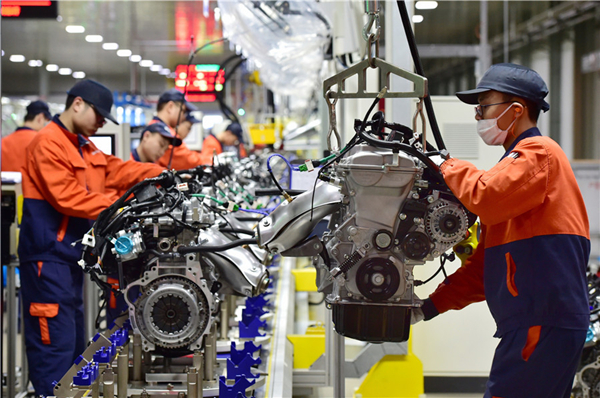Geely targets top spot among Chinese carmakers by 2025

Employees work on the production line of Geely Auto's engine manufacturing unit in Yiwu, Zhejiang province. [Photo by Lyu Bin / For China Daily]
Geely Auto expects its sales to reach 3.65 million units in 2025, which would make it the most popular Chinese marque in the country.
The privately-held carmaker, which owns Geely, Zeekr and Lynk & Co, unveiled the plan on Wednesday when it released its mid-year financial report.
Geely sold 630,237 vehicles in the first half of the year, up 19 percent from the same period last year.
Its revenue reached 45 billion yuan, up 22 percent, and its net profit stood at 2.41 billion yuan ($371.87 million), up 4 percent year-on-year.
Geely ranked third among Chinese carmakers in terms of sales in the first half. The carmaker said its overall sales could reach 1.53 million for the year despite the chip shortages that are affecting the global auto industry.
Geely said over 30 percent of its 3.65 million deliveries in 2025 would be smart electric cars and its Zeekr brand will seize a top three position globally among high-end electric brands with its deliveries reaching 650,000 units in the year.
Zeekr's first model, the Zeekr 001, priced from 299,000 yuan to 360,000 yuan, will be delivered in October this year. The brand will launch at least two new models a year from 2022.
"The Zeekr 001's orders have beat our expectations. They exceed the number we can produce this year," said Geely in a statement.
Besides the Chinese market, Geely said it will continue its efforts to expand its presence in global markets.
The carmaker exported 53,422 vehicles in the first half this year, up 173 percent year-on-year.
Lynk & Co, a brand Geely co-developed with Volvo, is now available in Europe, with local users reaching 15,000.
Geely is scheduled to release Lynk & Co's development plan for the Asia-Pacific region later this year.
In accordance with a deal with Renault earlier this month, the French carmaker will introduce Lynk & Co's platforms into South Korea for local vehicle production at its joint venture Renault Samsung Motors.





 play
play